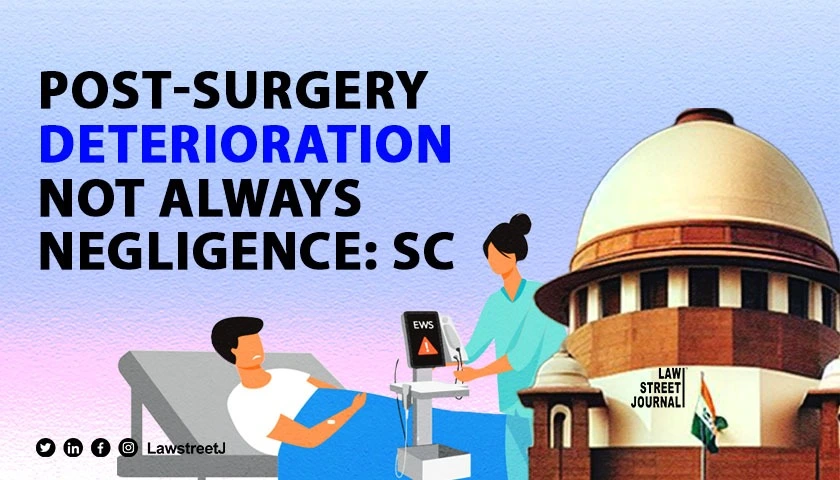NEW DELHI: In a significant judgment, the Supreme Court on Friday said deterioration in patient's condition post-surgery is not necessarily a sign of some medical negligence.
The top court said every failure of surgery or no positive response to treatment can't be termed as medical negligence unless it is established that the doctor failed to exercise the due skill possessed by him in discharging of his duties.
A bench of Justices P S Narasimha and Pankaj Mithal said when reasonable care, expected of the medical professional, is extended or rendered to the patient, it would not be a case for actionable negligence.
"A simple lack of care, an error of judgment or an accident is not sufficient proof of negligence on part of the medical professional so long as the doctor follows the acceptable practice of the medical profession in discharge of his duties," the bench said.
The court set aside a 2011 order of the National Consumer Disputes Redressal Commission, which directed a doctor and the hospital to pay Rs 3 lakh as compensation and Rs 50,000 as cost to complainant Jaswinder Singh and his father for negligence.
The bench here allowed an appeal filed by Dr Neeraj Sud and the prestigious Post Graduate Institute of Medical Sciences, Chandigarh.
Rejecting the plea by the complainant, the bench found no evidence was produced of any expert body in the medical field to prove that requisite skill possessed by Dr Sood was not exercised by him in discharge of his duties.
The bench said a doctor cannot be held liable for negligence merely because a better alternative treatment or course of treatment was available or that more skilled doctors were there who could have administered better treatment.
It also said a medical professional may be held liable for negligence only when he is not possessed with the requisite qualification or skill or when he fails to exercise reasonable skill which he possesses in giving the treatment.
As per the consumer complaint, a surgery was performed on the 6-year-old boy for the physical deformity diagnosed as PTOSIS, drooping eyelid in 1996. However, instead of any improvement, the condition of the eye further deteriorated post-surgery.
"Deterioration of the condition of the patient post-surgery is not necessarily indicative or suggestive of the fact that the surgery performed or the treatment given to the patient was not proper or inappropriate or that there was some negligence in administering the same. In case of surgery or such treatment, it is not necessary that in every case the condition of the patient would improve and the surgery is successful to the satisfaction of the patient," the bench said.
The bench opined it is very much possible that in some rare cases complications of such nature arise but that by itself does not establish any actionable negligence on part of the medical expert.
The doctor and the institute contended complainant was given proper treatment with due care during operation and that the correction and reoccurrence of PTOSIS is a common complication of congenital ptosis which could have been set right by repeat surgery. The patient was not examined by Dr Sud after January, 1997 as he was taken for treatment to Guru Nanak Eye Centre, Delhi and Dr Daljit Singh Hospital, Amritsar, they said.
During the period 1994-1996 when he was a Senior Resident at PGI, the doctor was associated with about 74 PTOSIS operations, they said. They also claimed Sud is a qualified post-graduate in ophthalmology. He had three years of experience in eye surgeries including surgery of PTOSIS.















